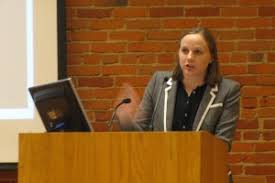By Emily L. Judd
Was Christianity’s central figure a political revolutionary? Among liberation theologians, Jesus is seen as a political activist whose movement challenged the oppressive rulers of his time. In the latest episode of the Yale Divinity School podcast, Professor Erika Helgen discusses liberation theology—the oft-debated combination of Marxist politics and Christianity.
Some major streams of traditional Christian theology view religion as a rejection of the world. But the modern theology of liberation summons Christians to press for social change and liberate people from social, political, and economic oppression.
***
“Was Jesus a revolutionary?” Listen to the interview.
***
“For a liberation theologian, there is no way to be apolitical,” says Helgen, Assistant Professor of Latino/a Christianity. To take that stance, she adds, is to “essentially take sides with the status quo and with the oppressor. Liberation theologians would say Jesus took sides with the oppressed.”
 In the interview, Helgen discusses how Pope Francis has placed liberation theology on the agenda of the Catholic Church. This is unlike previous popes, who criticized the movement and curbed its influence. Helgen says Pope Francis’ words and deeds clearly support liberation theology.
In the interview, Helgen discusses how Pope Francis has placed liberation theology on the agenda of the Catholic Church. This is unlike previous popes, who criticized the movement and curbed its influence. Helgen says Pope Francis’ words and deeds clearly support liberation theology.
“You can see a lot of liberation theology in what Pope Francis has been talking about: oppression and pushing back against clericalism. And there are the more obvious moves like inviting Gustavo Gutierrez, the father of liberation theology, to the Vatican, and the canonization of Archbishop Oscar Romero who was a proponent of liberation theology,” Helgen says.
Helgen also weighs in on the development of liberation theology, from its origins in 1960s South America to black liberation theology in North America and Palestinian liberation theology in the Middle East. Different branches of liberation theology focus on different teachings and scriptures.
“Liberation theology is not one cohesive whole. It is extremely contextual,” says Helgen.
Black liberation theology focuses on God’s liberation of Israel from Egypt in the Hebrew Bible, while Palestinian liberation theology instead concentrates on New Testament accounts of Jesus’ life as a Palestinian living under the Roman empire.
Helgen explains why there is not one common foundation among the different branches of liberation theology.
“Liberation theology is not about applying the theology to a situation. It is about being in a situation and then using that to inform your theology,” says Helgen.